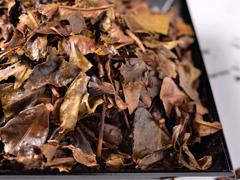Sun-dried evening tea / Nanpoen
- Regular price
-
¥540 - Regular price
-
- Sale price
-
¥540
Natural cultivation
Bancha tea, which is the first tea harvested, is steamed, dried under the summer sun, and roasted without being rolled.
In Yoshino in particular, this type of sun-dried bancha tea has been made and drunk for a long time.
Tea production using sun drying is dependent on the weather and takes time and effort, but it is the deliciousness and care that goes into it that makes it so great .
It has a slightly unique fragrance that comes from drying in the sun, but I think it is easier to drink than other regional bancha teas because it has a milder flavor. We have many repeat customers who love it and have families with children, teenagers, working adults, and the elderly.
When cooking tea in a kettle, first bring the water to a boil, then turn off the heat and add the tea leaves. If you boil it too hard, the aroma will disappear.)
Because the tea leaves are not rolled, it takes a little time for the flavor to develop, but it doesn't become bitter, so the longer you leave it, the richer the flavor will be.
I also recommend cold brewing. (Because the tea leaves are not rolled, it takes longer than regular tea leaves.)
I think it goes well with Japanese food as well as Western food.
Nanpoen, which was founded 200 years ago in Yoshino, a city that flourished as a major tea producing region during the Edo period, has records of winning a bronze cup in the green tea category at the Tokyo Exposition during the Taisho period.
Furthermore, the head of the family, Hideyuki Minami himself, won the Japan Tea Instructor Association Tea Judging Competition. With the long tradition, ambition and technical skills inherited, No matter which tea you drink at Nanpoen, it is of a high quality.
In fact, all the teas other than the ones sold in our store are not grown naturally (even if the packaging is the same, the contents are different), but they don't use herbicides and instead ask neighbors to pull out weeds, they use wood vinegar made from Yoshino cedar as a natural medicine, they add fermented fertilizer, and they keep the use of medicines to a minimum, so they aim to cultivate in harmony with the creatures in the soil.
Available in our store Naturally grown tea is
Yoshino is a place rich in nature and culture, so much so that Mount Yoshino itself is registered as a World Heritage Site. The Yoshino River receives water from the Oodaigahara Plateau, which boasts the highest precipitation in Japan.
We strive to create a cup of tea that resonates with the sounds of Satoyama life passed down from our ancestors in the clear air and the sounds of murmuring streams of nature."
Specially for us, they made sun-dried bancha tea, a traditional tea made in Yoshino using only leaves from tea fields that are grown without the use of pesticides or chemical fertilizers.
Why not experience the nature of Yoshino while drinking tea?
<From the farmer>
A unique bancha tea that has been handed down in Yoshino since ancient times.
Its refreshing aftertaste is popular.
The Yoshino River receives water from the Odaigahara Plateau, which boasts the highest rainfall in Japan. Surrounded by nature, clear air and the murmuring of a stream,
We work hard every day to help you resonate with the sounds of Satoyama life passed down from our ancestors through a cup of tea.
Nanpoen has been in business for over 200 years, dating back to the Bunka and Bunei eras of the Edo period, and I am the sixth generation owner.
Nanpoen's Yamato Tea brand, which continues to adhere to traditional manufacturing methods and management, is constantly undergoing trial and error so that people of all ages and genders can enjoy it.
We don't use herbicides, and we ask our neighbors to pull the weeds in the tea fields.
Pulling the grass makes the tea seem more energetic.
When turning the timber produced during the sawing process of Yoshino cedar into charcoal,
We use the wood vinegar we harvest as a natural pesticide.
Our farm still has a purchasing ledger for green tea buds from 1883.
In addition, this is an old tea shop with a history that includes having received a bronze cup from the then Governor of Tokyo in the green tea category at the Tokyo Exposition in the Taisho era.
We are confident that our tea-making techniques are second to none.
Couldn't load pickup availability




Sun-dried evening tea / Nanpoen
- Regular price
-
¥540 - Regular price
-
- Sale price
-
¥540


